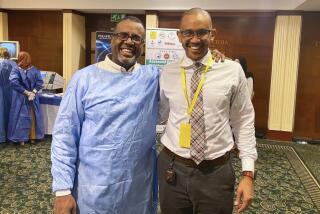Suliman Ali Baldo
- Share via
Suliman Ali Baldo, 52, works in the Empire State Building as a researcher for Human Rights Watch. Baldo left Sudan seven years ago to escape intensifying harassment of critics of the government. At that time, Sudan was a haven for Osama bin Laden and locked in civil war, with radical Islam gaining influence. Because of Sept. 11, Sudan began to change, and Baldo is going home.
*
“On Sept. 11, I was here in the Empire State Building. There’s a big window in the conference room that looks directly south at the World Trade Center.
My colleagues saw the airplane hitting the first tower. They were standing at the window and trying to make sense out of it. They saw the second plane coming and hitting the other building, and their immediate reaction was that this was a deliberate attack. They thought there were several small planes flying around hitting tall buildings in New York; therefore, they were a bit panicked and they ran here and got me and evacuated everyone.
I immediately suspected it was Al Qaeda because of [its] pattern of deliberate attacks on U.S. targets. I discussed it with my colleagues as we were milling around after evacuating. The group bombed the U.S. embassies [in Africa] and the USS Cole, regardless of the consequences for innocent people and the local population. The idea that kept coming back was that we should have seen it coming. This idea kept haunting me. They should have known this was coming; they should have taken precautions.
For me, it’s not a failure of intelligence, it’s a failure of understanding what lengths they would go to. I remember going home on Sept. 11. I found three dozen messages from Sudan, the [Persian] Gulf countries, friends from all over the Arab world. The attack was seen within the region as totally shocking. All these people--Arabs and Muslims--called just to see if we were OK and to say it was horrible that it happened. I still have the e-mails.
My two kids still come with me to the office sometimes. They like the Empire State Building. Even though I come from a flat country with nothing but one-story buildings, I don’t have any special worries about working here. But other people who know I work here are afraid for me because it is a symbolic building and now it’s the tallest building in New York. There seems to be a general fear out there about tall buildings.
At the beginning, there were lots of fire alarms in the building, bomb scares and evacuations. We hear the alarm, then we have to leave--maybe once a week at first, not so often now. We take it very seriously.
I try not to think about [Sept. 11]. But it’s an event that you are reminded of every day. Sirens and things are a constant reminder. There are also the international repercussions: the war in Afghanistan, threats of war in Iraq, the changing environment in international circles.
It is reflected quite strongly in my home country, Sudan. Sept. 11 has brought about real change. Because of this event, things are happening that were not conceivable a year ago.
Sudan once provided a safe haven for Osama bin Laden when he had no place else to go. His movement was allowed to gain power there. They kicked him out in 1996 because of all the pressure from the U.S., and now, once again, they are cooperating because of American pressure. They don’t want to be on the receiving end of this kind of terrorism, or to be held responsible for it.
Suddenly, there is some space to develop the foundation of civil society. Now there can be an independent media, women’s rights associations, independent human rights organizations [and] environmental groups.”
*
As told to Maggie Farley
More to Read
Sign up for Essential California
The most important California stories and recommendations in your inbox every morning.
You may occasionally receive promotional content from the Los Angeles Times.










